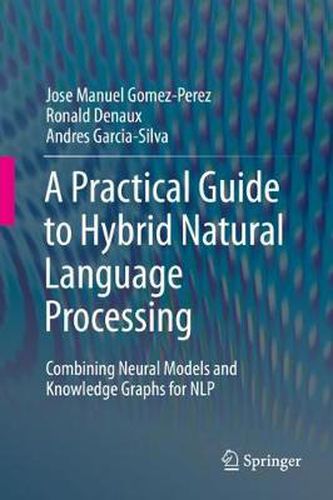Readings Newsletter
Become a Readings Member to make your shopping experience even easier.
Sign in or sign up for free!
You’re not far away from qualifying for FREE standard shipping within Australia
You’ve qualified for FREE standard shipping within Australia
The cart is loading…






This title is printed to order. This book may have been self-published. If so, we cannot guarantee the quality of the content. In the main most books will have gone through the editing process however some may not. We therefore suggest that you be aware of this before ordering this book. If in doubt check either the author or publisher’s details as we are unable to accept any returns unless they are faulty. Please contact us if you have any questions.
This book provides readers with a practical guide to the principles of hybrid approaches to natural language processing (NLP) involving a combination of neural methods and knowledge graphs. To this end, it first introduces the main building blocks and then describes how they can be integrated to support the effective implementation of real-world NLP applications. To illustrate the ideas described, the book also includes a comprehensive set of experiments and exercises involving different algorithms over a selection of domains and corpora in various NLP tasks.
Throughout, the authors show how to leverage complementary representations stemming from the analysis of unstructured text corpora as well as the entities and relations described explicitly in a knowledge graph, how to integrate such representations, and how to use the resulting features to effectively solve NLP tasks in a range of domains. In addition, the book offers access to executable code with examples, exercises and real-world applications in key domains, like disinformation analysis and machine reading comprehension of scientific literature. All the examples and exercises proposed in the book are available as executable Jupyter notebooks in a GitHub repository. They are all ready to be run on Google Colaboratory or, if preferred, in a local environment.
A valuable resource for anyone interested in the interplay between neural and knowledge-based approaches to NLP, this book is a useful guide for readers with a background in structured knowledge representations as well as those whose main approach to AI is fundamentally based on logic. Further, it will appeal to those whose main background is in the areas of machine and deep learning who are looking for ways to leverage structured knowledge bases to optimize results along the NLP downstream.
$9.00 standard shipping within Australia
FREE standard shipping within Australia for orders over $100.00
Express & International shipping calculated at checkout
This title is printed to order. This book may have been self-published. If so, we cannot guarantee the quality of the content. In the main most books will have gone through the editing process however some may not. We therefore suggest that you be aware of this before ordering this book. If in doubt check either the author or publisher’s details as we are unable to accept any returns unless they are faulty. Please contact us if you have any questions.
This book provides readers with a practical guide to the principles of hybrid approaches to natural language processing (NLP) involving a combination of neural methods and knowledge graphs. To this end, it first introduces the main building blocks and then describes how they can be integrated to support the effective implementation of real-world NLP applications. To illustrate the ideas described, the book also includes a comprehensive set of experiments and exercises involving different algorithms over a selection of domains and corpora in various NLP tasks.
Throughout, the authors show how to leverage complementary representations stemming from the analysis of unstructured text corpora as well as the entities and relations described explicitly in a knowledge graph, how to integrate such representations, and how to use the resulting features to effectively solve NLP tasks in a range of domains. In addition, the book offers access to executable code with examples, exercises and real-world applications in key domains, like disinformation analysis and machine reading comprehension of scientific literature. All the examples and exercises proposed in the book are available as executable Jupyter notebooks in a GitHub repository. They are all ready to be run on Google Colaboratory or, if preferred, in a local environment.
A valuable resource for anyone interested in the interplay between neural and knowledge-based approaches to NLP, this book is a useful guide for readers with a background in structured knowledge representations as well as those whose main approach to AI is fundamentally based on logic. Further, it will appeal to those whose main background is in the areas of machine and deep learning who are looking for ways to leverage structured knowledge bases to optimize results along the NLP downstream.